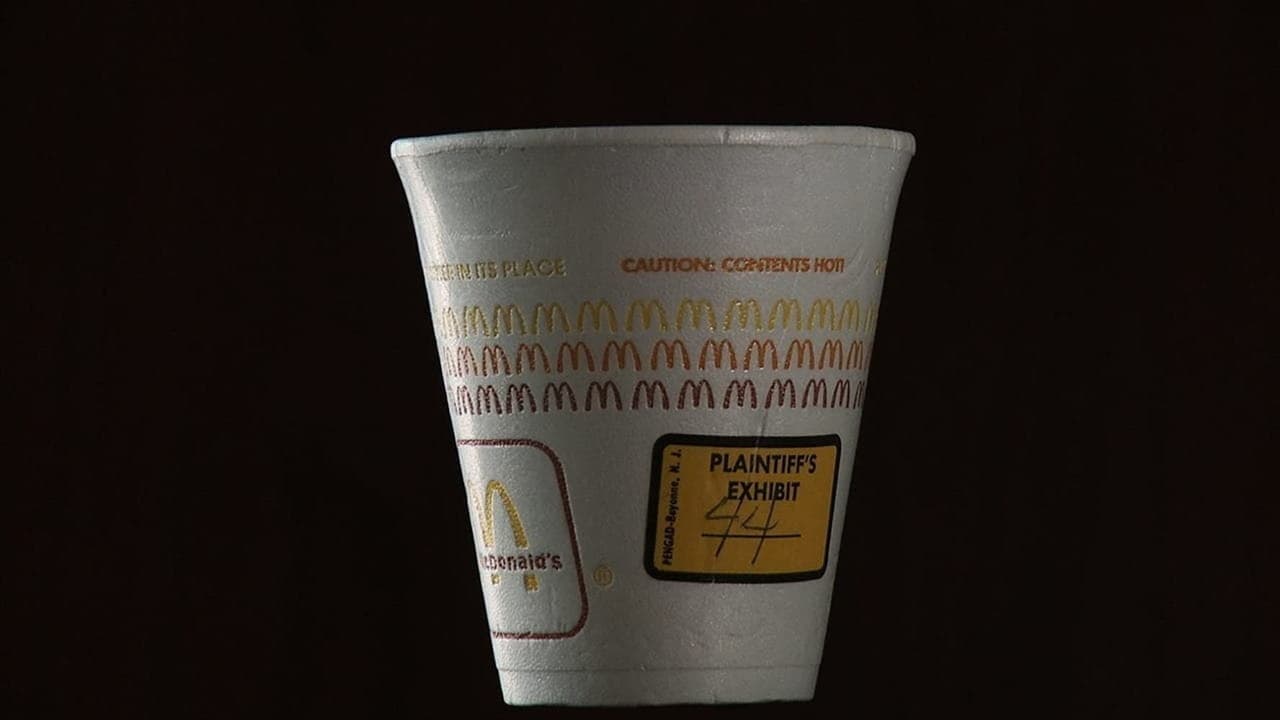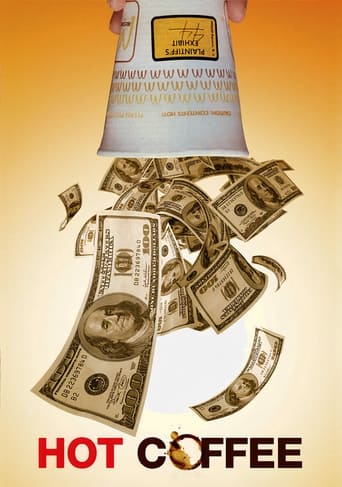Neive Bellamy
Excellent and certainly provocative... If nothing else, the film is a real conversation starter.
Bessie Smyth
Great story, amazing characters, superb action, enthralling cinematography. Yes, this is something I am glad I spent money on.
Scotty Burke
It is interesting even when nothing much happens, which is for most of its 3-hour running time. Read full review
rickkarnerclu
Hot Coffee is a must see. It shows the reality of what is behind the tort reform movement and how tort reform would hurt people and make safety and the consequences of cutting protections just a business decision based only on profit. Safty can be expensive, and the purpose of suing for harm done would make it more expensive to not be safe.Watch with an open mind, and you should be outraged.Again, a must see.Profit makes a good motivator to cut corners.A must see.
chuckju-1
It took me a few minutes after watching this "documentary" to remember that my mother used to visit friends or have them over, and they were all serving each other tea which they made by boiling water (212 degrees Farenheit...or 22 to 32 degrees hotter than MacDonald's coffee), pouring it into a flimsy teacup and handing it to each other. If any of the ladies had fumbled the tea onto their lap right after the boil, it would have left even worse burns than the old lady in the documentary suffered. I guess that would have been the fault of whomever was serving tea that day! This film was a good example of a public relations effort by the Democrat National Committee or the Obama re-election campaign, but its inability to deal with contrary views (other than as being summarized in a smarmy manner and thrown away as a paper tiger) shows how weak the effort was.
TheDocHierarchy
How does big business turn a multi-million dollar pay-out into a substantial coup for industry and a devastating blow for the civil justice system? Quite easily, according to Susan Saladoff's 'Hot Coffee'.On February 27, 1992, Stella Liebeck, a healthy, active 72 year-old woman spilled a cup of boiling hot McDonald's coffee on her inner thigh. Suing McDonald's for damages, she was awarded $160,000 in medical damages and $2.7 million dollars in punitive damages by a jury; a trial judge would later reduce the award, and the two parties settled confidentially. In the meantime Liebeck and her cause were being pilloried by the nation's media - how, they said, could a company be liable for the mishandling error of a patron?Big business latched onto this wave of public opinion to condemn, in a widespread and well- financed media campaign, the rising tide of so-called 'frivolous lawsuits' eating away at the profits of all businesses. 'Tort reform' became the new catch-cry of this push - 'tort' meaning a 'harm' essentially - as industry used its leverage to encourage politicians, judges and the public alike to get behind new regulation that would make pay-outs like the one to Stella Liebeck a mere memory. The problem with this lies between the lines of the Liebeck case. Court photos detailing the extent of Liebeck's injuries - which required two separate skin grafts and over $100,000 worth of medical costs - are horrifying, as are the revelations that McDonald's had received over 700 unanswered complaints about the potential for injury with their standardized coffee temperature. That the jury came down so vehemently on the side of the plaintiff, and the corporation lowered their temperature standard in the wake of the case demonstrates not that this was not the 'frivolous' lawsuit painted in the media, but an appropriate and necessary use of the civil justice system.Not content to rest on this relative bombshell - I for one was embarrassed at my lack of knowledge of the Liebeck case - Saladoff charts how the case was used to systematically introduce US-wide 'tort reform', in the manner of both 'caps on damages' and 'mandatory arbitration' clauses in contract. These 'reforms' ensure that big business is protected from not merely the very few con artists seeking to extort them out of money (of which Liebeck is not one), but also the majority of whom have a reasonable and justified case to put forward to a civil court.The tragedy is this whole sage is not that Liebeck received such a pay-out, but that with these new misnomers of 'reforms', the likes of Liebeck are no longer sufficiently protected from the rich and powerful. Accountability is gradually being eroded, with the tacit consent of the people no less.Concluding Thought: How have I gone this long without knowing the context of the McDonald's case? Should I have been more diligent and found out myself, or can I blame the media?
paulhundal
I wish every American could see this film to understand how their views can be manipulated by high paid corporate lobbyists. It also shows how important our court system is to all of us as long as it is kept clean and independent and not subject to outside influence through the campaign financing process. It is well researched and well produced. I am impressed. I have to commend HBO for this production. It is truly relevant and a great contribution to documentary media. I must say I would not have expected them to support such an insightful production that touches on a topic that exposes some of the worst examples of abuse by corporate America. What Halliburton did to its employee was truly outrageous. You will have to see the film to know what I am talking about.

